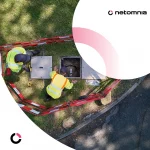UK Countryside Alliance Poll Claims Broadband Upgrade to Kickstart Economy
A new ComRes survey of 2,016 adults in Great Britain has found that 80% of people (rising to 85% in rural areas) expect that rolling out faster broadband across the whole of the United Kingdom would improve the economy. But 69% say that the focus should be on ensuring that everyone can get connected first (i.e. before tackling better speeds).
By comparison 72% of respondents felt that greater investment in renewable energies would deliver a boost to the economy, which fell to 54% for major transport projects (Crossrail), 52% for building a new international airport and 51% for a third runway at Heathrow. At the bottom only 45% felt that the government’s controversial HS2 (high speed train) scheme would be beneficial.
Advertisement
But perhaps unsurprisingly the survey also found that 29% of rural dwellers were dissatisfied with the speed of their broadband connection, which falls to 18% among urban residents. Elsewhere just 9% agreed that the Government should focus on maximising speed in major urban areas.
Barney White-Spunner, Executive Chairman of the CA, said:
“Innovations in digital services mean it has never been more important that rural business and people living in the countryside have access to broadband and good mobile phone signal.
Broadband is the most important technological innovation to kickstart the rural economy and the Government needs to ensure that those living and working in the countryside do not fall behind their urban peers because they cannot access it.”
Unfortunately the survey doesn’t say anything particular new but it does show that a sizeable portion of both urban and rural people are still dissatisfied with the speed of their internet connection, which is an important reminder that rural areas aren’t the only ones with an infrastructure problem.
Amazingly many urban and sub-urban locations often get left behind too and this can be just as much an issue of competition (i.e. if Virgin Media dominates a particular street then BT might feel less inclined to invest in an upgrade there) as it can one of poor infrastructure.
Mark is a professional technology writer, IT consultant and computer engineer from Dorset (England), he also founded ISPreview in 1999 and enjoys analysing the latest telecoms and broadband developments. Find me on X (Twitter), Mastodon, Facebook, BlueSky, Threads.net and Linkedin.
« Suffolk UK Bring BDUK and BT Superfast Broadband Upgrades Forward

















































Comments are closed